Key takeaways:
- Team huddles and recognizing individual efforts enhance morale and create a sense of belonging in the food business.
- Implementing fun challenges and empowering team members fosters creativity and strengthens unity, especially during high-pressure situations.
- Effective communication, including regular feedback and acknowledgment of contributions, significantly boosts team motivation and productivity.
- Involving staff in decision-making and adjusting work schedules can lead to innovative solutions and improved morale.
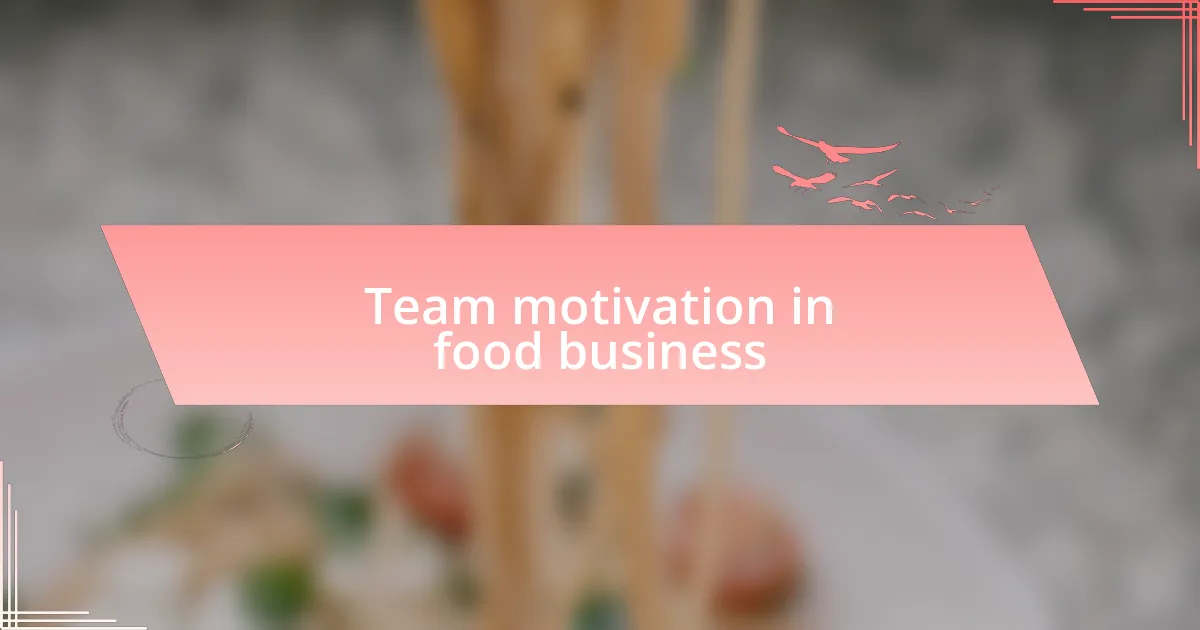
Team motivation in food business
In the fast-paced world of the food business, keeping team morale high is crucial. I remember a time when our kitchen staff was overwhelmed during peak hours. To lighten the mood, we started a quick team huddle before every shift, sharing a laugh or two, which made a noticeable difference in their energy levels. Isn’t it interesting how a simple moment of connection can transform a hectic atmosphere?
Recognizing individual efforts goes a long way in motivating a team. I’ve often found that when someone goes above and beyond—like our server who remembered regular customers’ names and preferences—they appreciate a shout-out. It’s not just about saying “well done”; it’s about acknowledging the personal touch they bring to the table. Have you ever experienced that gratifying feeling when someone recognizes your hard work? It fuels not only confidence but also a strong sense of belonging.
Food is a common passion that can bridge gaps within a team. I once organized a small competition where each member brought in their favorite dish for a potluck. The excitement and creativity were palpable, forming a camaraderie that extended beyond the kitchen. How can we utilize our shared love for food to inspire and motivate each other every day? It’s in these moments that we realize the power of food as a unifying force and a motivator in our work environment.
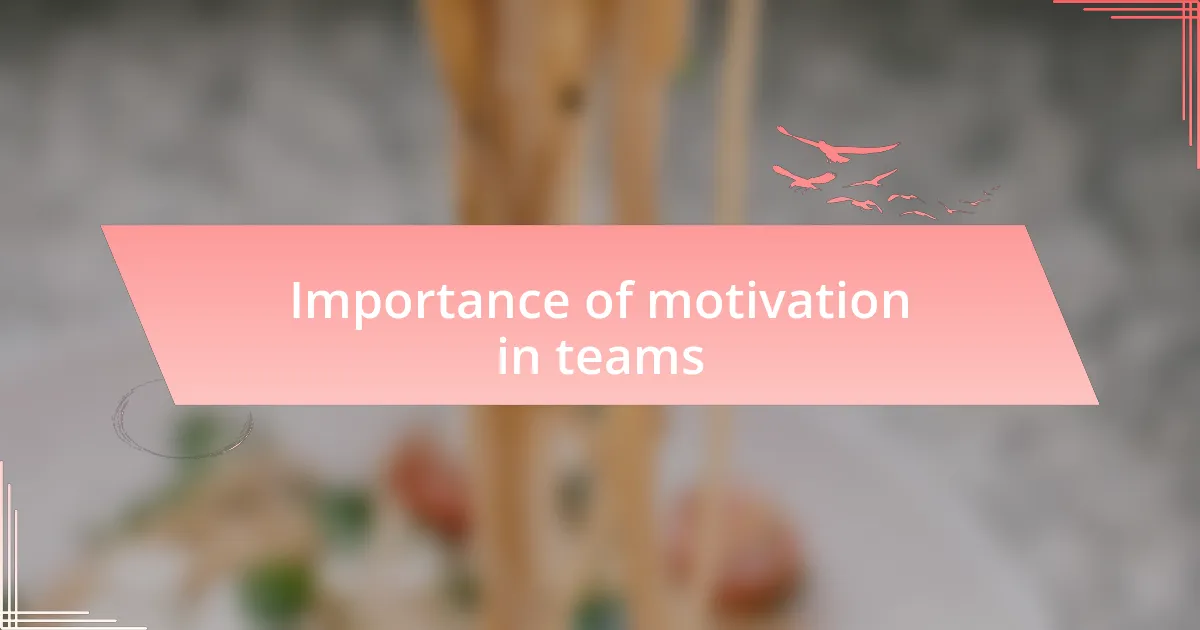
Importance of motivation in teams
Motivation within a team is essential, especially in a field as dynamic as the food business. I recall a particularly busy Saturday shift when we were understaffed, and tensions ran high. Instead of letting frustration simmer, we implemented a fun challenge to see who could create the most inventive dish from our leftover ingredients. The competition not only sparked creativity but also lifted everyone’s spirits, reminding us that our ability to adapt and innovate is what sets us apart.
When team members feel motivated, their productivity and satisfaction levels increase significantly. In one of my previous experiences, I noticed that when I allowed our line cooks to take the lead on menu specials, it infused them with a sense of ownership. I saw how their pride in their creations elevated the quality of our dishes and the overall dining experience. It’s fascinating how empowerment can be a game changer, isn’t it? This synergy reinforces the importance of fostering an environment where creativity thrives.
Moreover, motivation cultivates resilience in the face of challenges. During a particularly difficult event where everything seemed to go wrong, I gathered the team for a quick pep talk, emphasizing how setbacks are part of growth. This open dialogue not only reinforced our unity but also encouraged everyone to share their ideas on overcoming obstacles. Have you ever noticed how a motivated team can tackle setbacks with a sense of optimism? That collective spirit can turn challenges into opportunities, and that is a powerful aspect of motivation in teamwork.
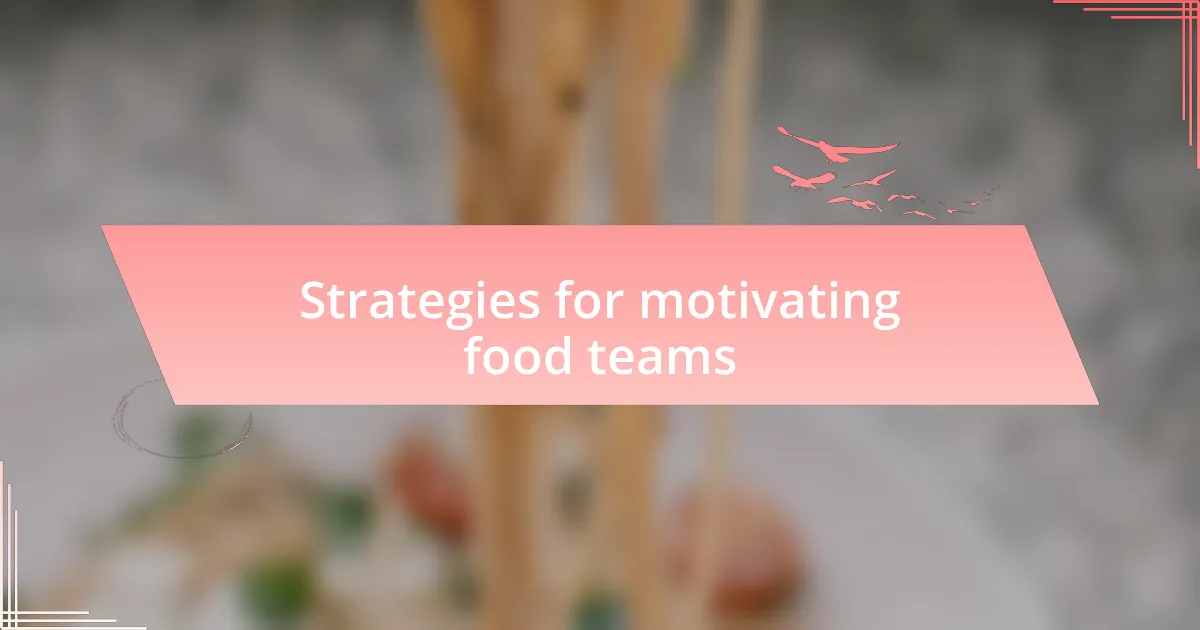
Strategies for motivating food teams
Creating a supportive environment is vital for motivating food teams. I remember implementing monthly team lunch outings where everyone could share not just food but ideas in a relaxed atmosphere. These moments often unveiled hidden passions, like a colleague’s love for baking, which later led to a new dessert special. Isn’t it incredible how bonding over a shared meal can ignite creativity and connection?
Recognizing individual contributions can be a powerful motivator as well. In one of my past teams, we introduced a “Chef of the Month” recognition program that allowed team members to nominate peers for their hard work and innovation. It was heartwarming to see quiet team members step into the spotlight, gaining confidence while others celebrated their talents. This simple gesture not only reinforced camaraderie but also sparked friendly competition among the team—how can we elevate the standards together?
Lastly, incorporating regular feedback sessions proves invaluable. I implemented brief weekly check-ins where team members could voice their thoughts on the menu and operations, fostering an open dialogue. It surprised me to discover how even the smallest tweaks suggested by the team could enhance efficiency and morale. Have you experienced how just listening can transform team dynamics? The insights gained during these sessions often led to collective solutions, proving that when everyone feels heard, they become more invested in our success.
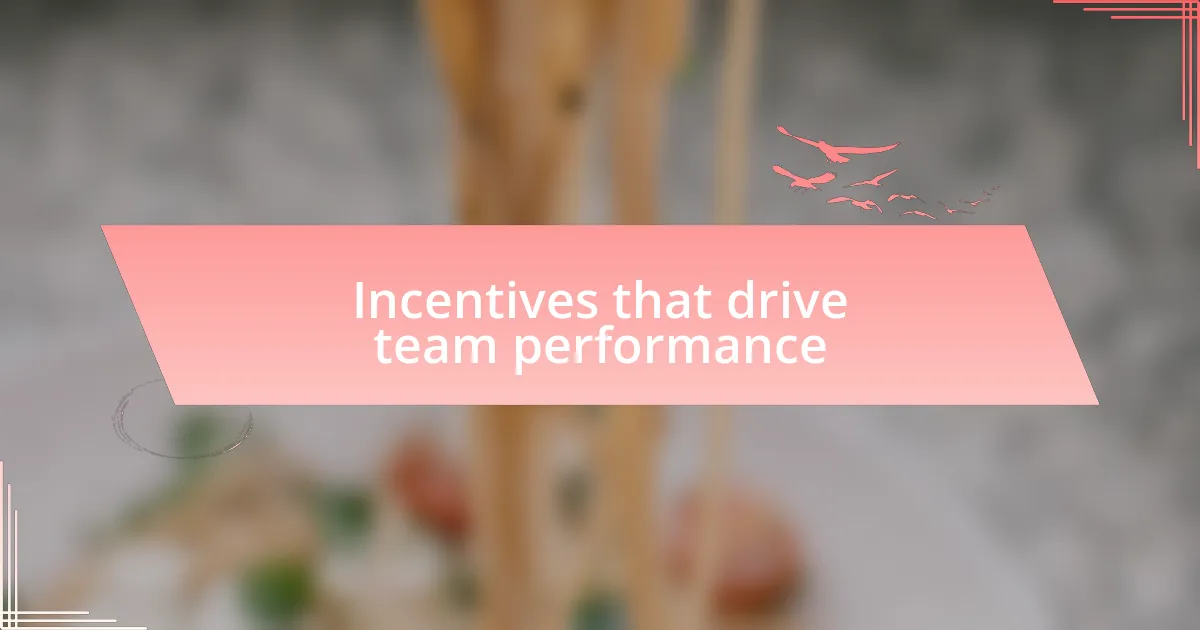
Incentives that drive team performance
Incentives that drive team performance can take many forms, and I’ve found that financial bonuses tied to performance metrics can create a tangible drive for improvement. For instance, when we introduced a quarterly bonus for achieving sales targets, the energy in the kitchen shifted dramatically. Suddenly, everyone was working together to find ways to promote our best dishes, turning friendly kitchen banter into collaborative strategies. Isn’t it fascinating how a shared goal can unify a team?
Another approach I’ve seen work wonders is the introduction of skill development incentives. In one of my experiences, we encouraged team members to pursue culinary certifications by covering part of their course fees. I remember one chef who initially doubted his abilities but blossomed after taking a specialized course in pastry arts. Watching his skills evolve not only boosted his confidence but also elevated the entire team’s pastry offerings. Doesn’t investing in people’s talents create a deeper sense of belonging?
Celebrating milestones, no matter how small, can serve as potent motivation, too. I implemented a “Cheers to You” board in our staff area where accomplishments, both personal and professional, were highlighted weekly. One of our newer team members brought her painting skills to the team and designed a beautiful menu mural, which turned into a proud centerpiece of our restaurant. Isn’t it amazing how recognizing achievements can inspire others to contribute their unique gifts?
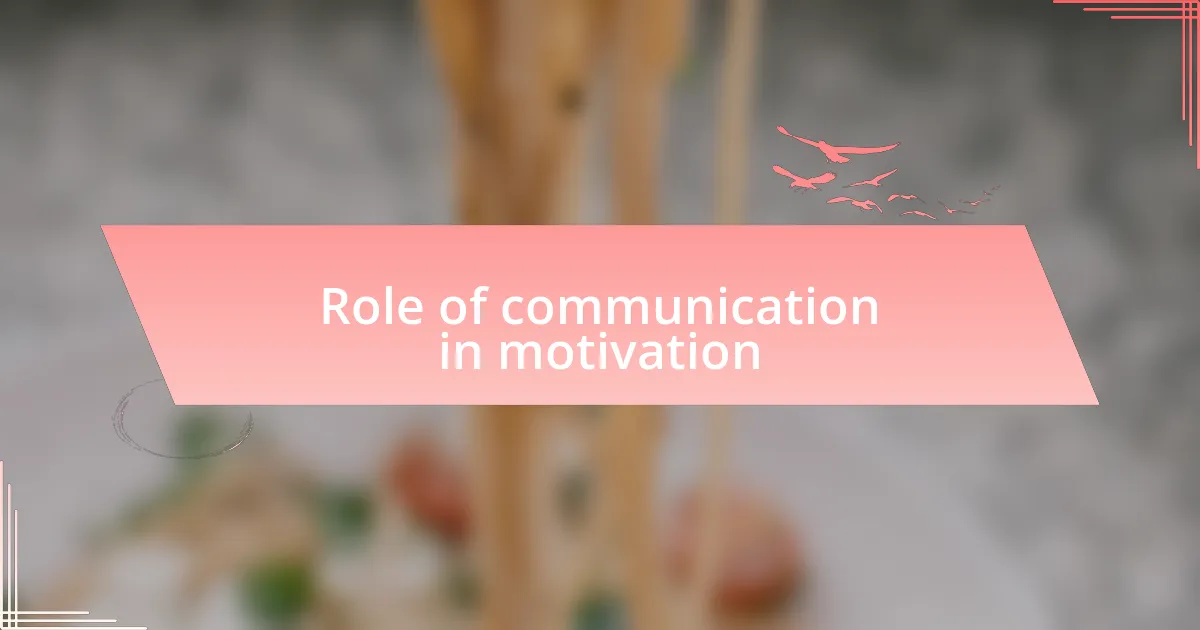
Role of communication in motivation
Effective communication is the heartbeat of motivation in any team. I remember when we implemented weekly check-ins where everyone had the chance to share their thoughts and challenges. This open dialogue not only fostered transparency but also made team members feel valued and heard, sparking a renewed enthusiasm among the staff. Isn’t it incredible how simply asking for feedback can elevate a team’s morale?
Moreover, clear communication of expectations plays a pivotal role in motivation. I once observed how a lack of clarity led to confusion during a busy dinner shift, causing frustration among the team. After that, we started outlining daily goals at the beginning of each service, which made a remarkable difference. Doesn’t having a roadmap for each shift help everyone to stay on track and contribute effectively?
Lastly, acknowledging efforts through communication can be a game-changer. I recall a moment when I took the time to individually thank a server for their hard work during a particularly hectic weekend. The spark in their eyes was unmistakable; it reminded me that a simple “thank you” can often propel someone to dig even deeper. Aren’t these little moments of recognition what truly foster a motivated environment?
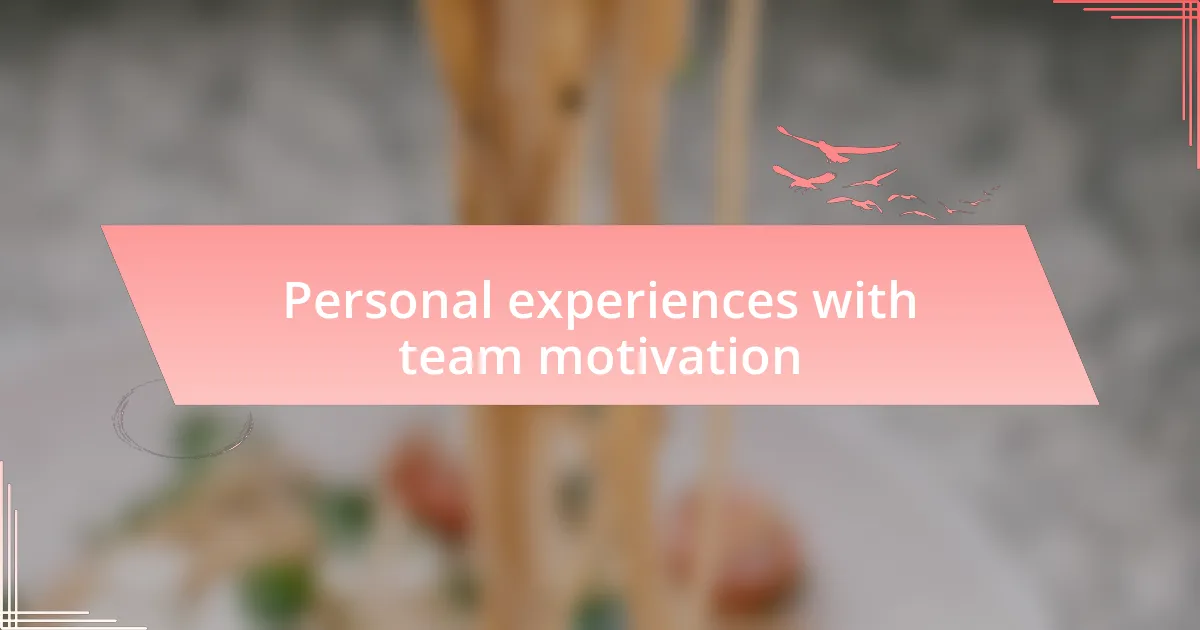
Personal experiences with team motivation
One of my most successful strategies for team motivation came during a particularly challenging holiday season. We organized a team-building retreat focused on fun activities like cooking competitions and team challenges. The laughter and camaraderie that emerged created lasting bonds among the staff, reminding me that sometimes stepping away from the daily grind can reignite the passion for our work. Have you ever noticed how shared experiences can transform a group dynamic?
There was a time when I thought motivation solely came from financial incentives. However, I realized the profound impact of recognition beyond money. After introducing a “employee of the month” recognition program, I witnessed firsthand the pride in my team’s eyes when they achieved that honor. It drove home the point that people crave acknowledgment for their hard work, don’t you think?
One memorable experience was when I held a surprise appreciation lunch for the kitchen staff after a successful event. Their surprised smiles and the heartfelt conversations we shared over good food showed me that sometimes, the best motivator is simply taking the time to celebrate what we’ve accomplished together. Isn’t it fascinating how food—our passion—can also nurture relationships and boost morale?
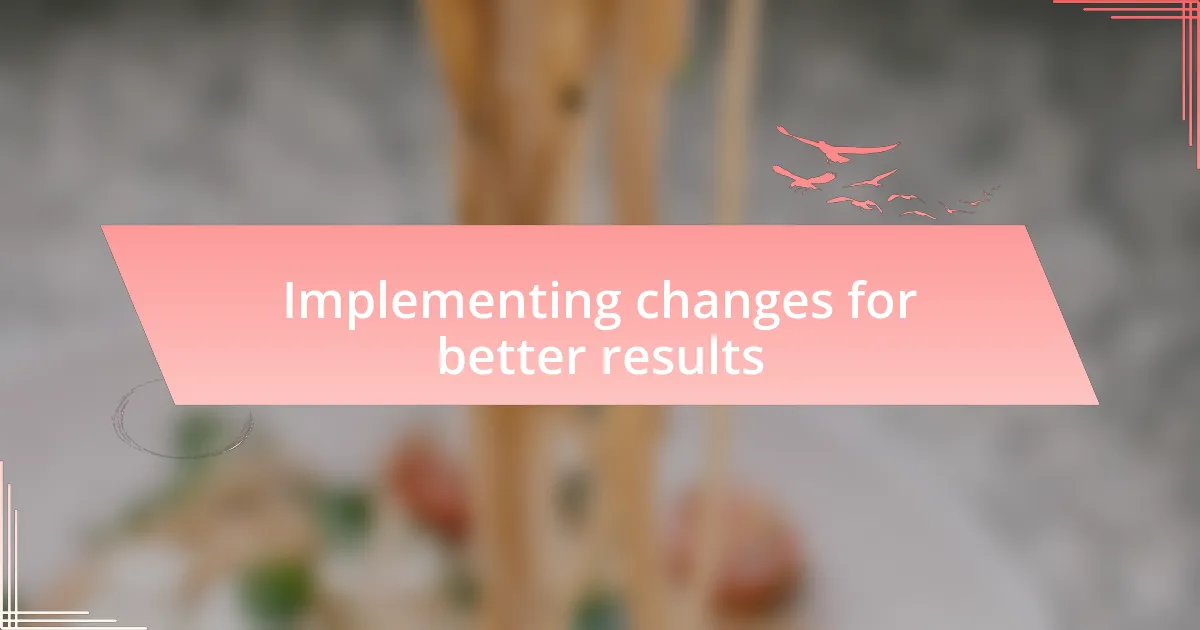
Implementing changes for better results
When implementing changes for better results, I learned the importance of gathering feedback from my team. During one brainstorming session, I asked for insights on our menu design, and it was eye-opening. The suggestions they provided not only improved our offerings but also made them feel valued in the process. Isn’t it remarkable how involving employees in decision-making can lead to more innovative outcomes?
Another effective change was adjusting our scheduling system to promote work-life balance. After discussing the struggles my staff faced with the previous rigid hours, we adopted a flexible schedule that allowed everyone to have a say in their shifts. The resulting improvement in morale and productivity was astonishing. I often wonder why more businesses don’t prioritize such adjustments, especially when it yields enthusiastic team members.
I also took a moment to reassess our training programs and discovered they lacked the hands-on approach my team thrived on. By introducing more practical workshops where staff could directly engage with culinary techniques, I saw a surge in both confidence and creativity. This shift not only boosted skill levels but also made our kitchen a more exciting place to work. Can you imagine how invigorating it must feel to learn in an environment that emphasizes collaboration and practical experience?